Posted: December 20, 2015 | Author: Rick Dunham | Filed under: Journalism Training, Rick's Rules, U.S. politics | Tags: 2016 presidential race, cropping, Donald Trump, Journalism Training, media bias, multimedia journalism, Nancy Pelosi, photo composition, photo cropping, photo editing, photography, presidential election, White House |
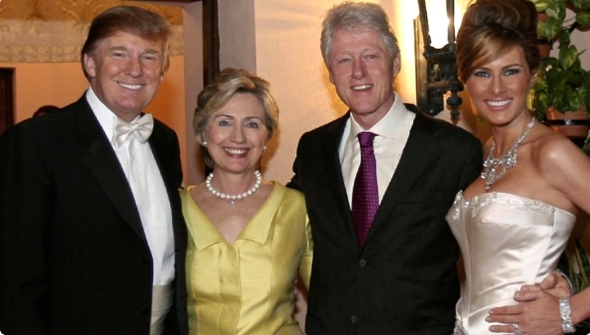
Marital bliss: This photograph from Donald Trump’s latest wedding is fraught with political overtones.
Photography captures reality.
Or does it?
Yes, a high-quality photograph that follows my 25 rules of photo composition can be a major asset for your multimedia journalism report.
But a photograph is not necessarily objective reality. Why?
Cropping.
As you edit the photograph, you are making editorial decisions: What part of the photo is most important or newsworthy? (That is different than editing decisions based on attractiveness.)
Here are two examples: One benign, one politically charged.
I took the first photo in my final day on the White House beat, Sept. 2, 2013. It shows House Democratic leader Nancy Pelosi speaking to a group of reporters outside the West Wing entrance (also known as “the Stakeout”). The second photo is a wedding snapshot featuring Bill and Hillary Clinton at Donald Trump’s most recent wedding.

Nancy Pelosi at the Stakeout. The viewer’s eye focuses on the media scrum.

The edited photo focuses on Nancy Pelosi.

The original image: The Trumps and Clintons are all smiles at Donald Trump’s latest wedding.

Edited photo #1: That was then, this is war: Hillary and Donald look happy together. That’s not the way they’re acting in the heat of the presidential race.
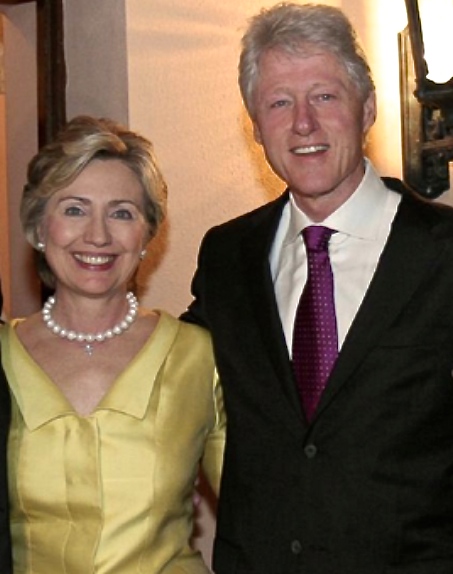
Edited photo #2: Editing out the Trumps, this could be any of the tens of thousands of Clinton family photos taken over the decades.

Edited photo #3: Editing out the spouses, this version looks like Bill Clinton is enjoying his time with Mrs. Trump. It emphasizes their left hands meeting along her waist.
The Trump-Clinton wedding photo is fraught with political overtones. Some of Trump’s 2016 Republican presidential campaign rivals would like to remind voters of his bipartisan past and his longtime coziness with the Clintons. The unedited photo is incontrovertible evidence that the two families were close enough that they were all smiles together in the not-so-distant past.
By focusing on Donald and Hillary, the photo editor chooses to highlight the 2016 rivalry, without the spouses. It’s Hillary vs. Donald. All smiles then. All insults now.
By editing out the Trumps, this is an unexceptional photo of Bill and Hillary Clinton smiling for the cameras. Little news value.
By editing out Donald and Hillary, the photo focuses on Bill Clinton with his arm around an attractive woman. Her left hand touches his, prompting the viewer to reach her/his own conclusion about the body chemistry.
The takeaway lesson: When you are editing photos for content, think about how your cropping decisions change the meaning of the image in the eyes of your audience. Are you sending the message you want to send? Are you fairly reflecting reality? Are you being fair to the subjects in the photo?
If you are a professional photo editor, the answer to all of the questions should be yes.
Posted: September 21, 2015 | Author: Rick Dunham | Filed under: Breaking news, Discovering China, U.S. politics | Tags: Barack Obama, Bernie Sanders, Binyamin Netanyahu, China, Chinese economy, Chris Christie, Communist Party, Dan Quayle, Deng Xiaoping, Donald Rumsfeld, Donald Trump, Franklin D. Roosevelt, George H.W. Bush, George W. Bush, Hassan Rohani, Henry Kissinger, Japan, Jeb Bush, Jim Mann, John Kerry, Mao Zedong, Margaret Thatcher, Michael Keaton, Mr. Mom, Nancy Pelosi, Pat Buchanan, Paul Prudhomme, peace, Philadelphia Inquirer, Pope Francis, Raul Castro, Rick Perry, Ronald Reagan, Shinzo Abe, Ted Cruz, terrorism, The China Fantasy, United States, Vladimir Putin, Wang Jiarui, Washington Post, world peace, Xi Jinping |
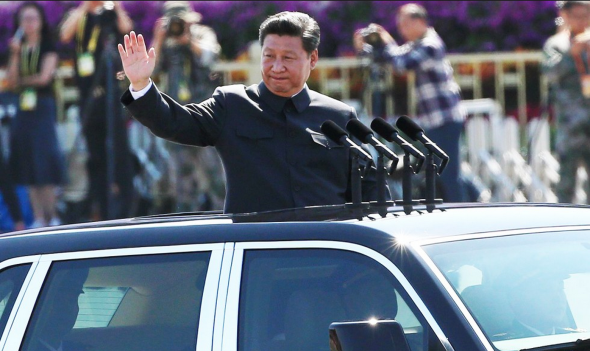
Images of Xi Jinping at the Sept. 3 military victory parade were shared around the world. But who is the Chinese leader and what does he stand for?
Chinese President Xi Jinping is coming to the United States, and very few Americans (or even American journalists) know much about the leader of the nation’s most populous country.
With apologies to Vladimir Putin, he has been called the most powerful leader in the world. But what does that mean?
Is Xi a reformer? Is he a hardliner? Is he a step forward, a step back — or both? Is he firmly in control or fearful of rivals within the ruling elite — or both? Is “Big Daddy Xi” widely popular or the beneficiary of a manufactured cult of personality?
As much as I’ve learned about China over the past two years, I still have a lot to learn. For additional background, I recommend you check out my former Philadelphia Inquirer colleague Jim Mann’s recent commentary in the Washington Post:
For American pundits, China isn’t a country. It’s a fantasyland.
In the meantime, test your knowledge of who Xi Jinping is — and isn’t — by taking this news quiz. Which of these statements are from Xi and which are from other world figures? Good luck.
For answers, scroll to the bottom of the post, after the final photo. Click on the quotations to read the original source material.
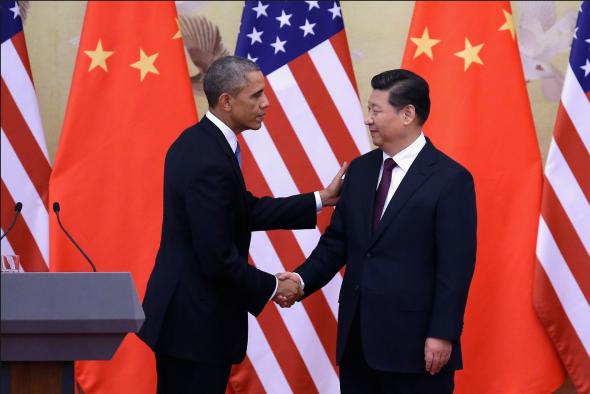
President Barack Obama and Xi Jinping have been careful to treat the other with respect and discuss fundamental disagreements without alienating the other nation’s leadership.
Who said the following?
1. Japan is “eating our lunch.”
a) Xi Jinping
b) Donald Trump
c) Paul Prudhomme
2. “(We must) make terrorists become like rats scurrying across a street, with everybody shouting ‘beat them!’”
a) Xi Jinping
b) George W. Bush
c) Donald Rumsfeld
3. “Some foreigners with full bellies and nothing better to do engage in finger-pointing at us.”
a) Xi Jinping
b) Pat Buchanan
c) Chris Christie
4. “America must be a light to the world, not just a missile.”
a) Xi Jinping
b) Barack Obama
c) Nancy Pelosi
d) George H.W. Bush
5. A cooperative United States-China relationship is “essential to global stability and peace.”
a) Xi Jinping
b) Barack Obama
c) Henry Kissinger
6. “To build a community of common destiny, we need to pursue common, comprehensive, cooperative and sustainable security.”
a) Xi Jinping
b) George W. Bush
c) Margaret Thatcher
d) Ronald Reagan
7. “Our people love life and expect better education, more stable jobs, better income, more reliable social security, medical care of a higher standard, more comfortable living conditions, and a more beautiful environment.”
a) Xi Jinping
b) Pope Francis
c) Raul Castro
d) Barack Obama
8. “Japan is not being nice to us.”
a) Xi Jinping
b) Donald Trump
c) Franklin D. Roosevelt
d) Theodore Roosevelt
9. “Resolute and decisive measures must be taken and high pressure must be maintained to crack down on violent terrorists who have been swollen with arrogance.”
a) Xi Jinping
b) Barack Obama
c) Binyamin Netanyahu
10. “I know what America is. America is a thing you can move very easily, move it in the right direction. They won’t get in our way.”
a) Xi Jinping
b) Barack Obama
c) Binyamin Netanyahu
11. “The international forces are shifting in a way that is more favorable to maintaining world peace.”
a) Xi Jinping
b) Shinzō Abe
c) Barack Obama
c) Hassan Rohani
12. “We should uphold the idea that working hard is the most honorable, noblest, greatest and most beautiful virtue.”
a) Xi Jinping
b) Margaret Thatcher
c) Marco Rubio
d) Ronald Reagan
13. “When did we beat Japan at anything?”
a) Xi Jinping
b) Donald Trump
c) Michael Keaton in “Mr. Mom”
d) The captain of the U.S. Olympic baseball team
14. “Our strength comes from the people and masses. We deeply understand that the capability of any individual is limited, but as long as we unite as one, there is no difficulty that we cannot overcome.”
a) Xi Jinping
b) Bernie Sanders
c) Mao Zedong
d) Ronald Reagan
15. “Economic growth … is going to come from the private sector. But the No. 1 thing government can do to encourage that growth is get out of the way.”
a) Xi Jinping
b) Deng Xiaoping
c) Ted Cruz
16. “As Deng Xiaoping said, we must ‘seek truth from facts.’ ”
a) Xi Jinping
b) Barack Obama
c) George H.W. Bush
17. “People should not underestimate me.”
a) Xi Jinping
b) George W. Bush
c) Bernie Sanders
d) Vladimir Putin
18. “The Communist Party is keenly aware one of the reasons its predecessor in China, the Nationalists, lost the Chinese civil war in 1949 was because of the terrible corruption under their rule, costing them public support.”
a) Xi Jinping
b) Henry Kissinger
c) Jim Mann, American journalist and author of The China Fantasy
d) Wang Jiarui, head of the Communist Party of China’s international department
19. “When China and the United States work together, we can be an anchor for world stability and the propeller of world peace.”
a) Xi Jinping
b) George W. Bush
c) Dan Quayle
d) Rick Perry
20. “Our two nations are poised to take an historic step forward on the path of peaceful cooperation and economic development. I’m confident that our trip will be a significant success, resulting in a stronger U.S.-China relationship than before. For Americans, this will mean more jobs and a better chance for a peaceful world.”
a) Xi Jinping
b) Barack Obama
c) John Kerry
d) Ronald Reagan
Answers below this photo.

XI Jinping is honored in Iowa, where he lived several decades ago.
1.b; 2.a; 3.a; 4.c; 5.c; 6.a; 7.a; 8.b; 9.a; 10.c; 11.a; 12.a; 13.b; 14.a; 15.c; 16.b; 17.c; 18.d; 19.a ; 20.d
Posted: October 8, 2013 | Author: Rick Dunham | Filed under: Dunham's Discourses, Top Ten, U.S. politics | Tags: American politics, Barack Obama, China, Chuck Hagel, Eric Cantor, Fox News, Harry Reid, Hillary Clinton, Jack Lew, Jay Carney, Joe Biden, John Boehner, John Kerry, John McCain, Marco Rubio, Mitch McConnell, Nancy Pelosi, Obama, Rush Limbaugh, Sarah Palin, Sean Hannity, Ted Cruz, United States |
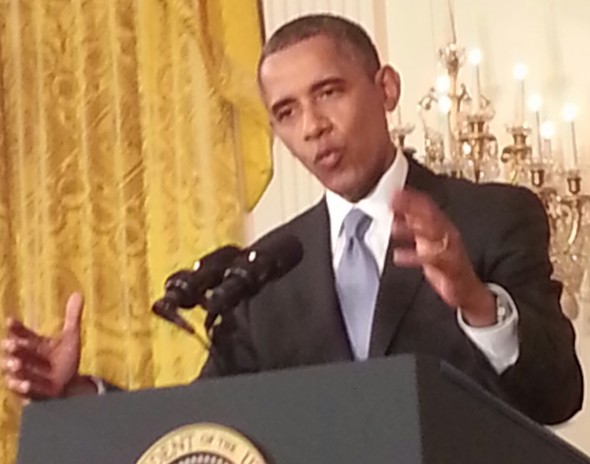
President Obama at my last White House press conference in August. (Photo by Rick Dunham)
After covering the White House and the U.S. Congress for 29 years — and being inside the 24/7 news bubble — it’s fascinating to be, for the first time, on the outside looking in.
Here’s a new outsider’s perspective on which American politicians figure most prominently around the world, and which DC figures vanish from the media scene when you cross the Pacific.
America’s Face around the World
1. President Barack Obama
The president is the president. He gets global press on some stories that earn barely a ripple in America-centered domestic media.
2. Secretary of State John Kerry
He didn’t get elected president, but his stentorian voice is everywhere on international issues. He comes across as knowledgeable, poised and, well, diplomatic.
3. House Speaker John Boehner
The Ohio Republican is the scowling face of the opposition. His soundbites are almost all partisan and negative. Not much of an image to project.
4. Sen. Ted Cruz
The first-year lawmaker from Texas has exploded onto the international stage as the leader of America’s ultraconservatives, which the global media love to highlight. Even people who don’t understand the concept of a filibuster understand that Cruz is the man who shut down the federal government. And he’s not even president.
5. Treasury Secretary Jack Lew
The American media almost never cover the charismatically challenged Treasury Secretary. Most Americans know him as the man with the illegible signature. But he’s often on TV and Internet news reports around the world. He comes across as measured and authoritative.
6. Hillary Clinton
The former U.S. Secretary of State is treated as America’s president-in-waiting. She’s also covered like the leader of the hawkish wing of the Democratic Party, as opposed to the dove-ish Obama.
The Dead-to-the-World Dozen
1. Vice President Joe Biden
Never mentioned. Well, almost never.
2. Senate Republican Leader Mitch McConnell
Who is less important than the minority leader of a body that has been eclipsed by the hard-right Republicans in the other chamber?
3. House Democratic Leader Nancy Pelosi
Maybe the only person less important than the Senate Minority Leader is the House Minority Leader.
4. Senate Majority Leader Harry Reid
He only appears on international TV when he comes up with his sound-bite zingers tearing into the Republicans.
5. Sen. John McCain
A media darling in the U.S., his mavericky style doesn’t translate to an international audience.
6. Sarah Palin
The only thing people in Asia remember about 2008 Republican vice presidential nominee is the report in Game Change that she didn’t know the Korean peninsula was divided into two countries.
7. Rush Limbaugh, Sean Hannity and the Fox News crowd
They may get good ratings in the USofA, but they don’t exist outside of its borders. And that’s probably fine with them.
8. Sen. Marco Rubio
The Florida freshman’s mystique hasn’t stretched to Asia and Europe, only Latin America and South America.
9. House Majority Leader Eric Cantor
There’s only room for one face of the opposition on international TV, and that’s John Boehner, not his (occasionally) loyal deputy from Virginia.
10. Defense Secretary Chuck Hagel
Barack Obama and John Kerry speak for the U.S. on global issues. The Pentagon chief is a bit player on the international stage.
11. White House press secretary Jay Carney
President Obama’s spokesman, a ubiquituous presence on domestic media, makes only cameo appearances on media outlets outside the U.S.
12. The U.S. Trade Representative
Who is the U.S. trade rep anyway? There are lots of trade stories, but the U.S. Commerce Secretary and U.S. Trade Representative are never quoted. Only Obama or Kerry.
Posted: September 13, 2013 | Author: Rick Dunham | Filed under: Discovering China, Top Ten, Uncategorized | Tags: Beijing, Beijing pollution, Beijing subway, Biking in Beijing, Caroline Ward, Dallas Cowboys, Houston Texans, Jane Sasseen, Kentucky Fried Chicken, Nancy Pelosi, Pennsylvania, Philadelphia Eagles, Pollution, Tea Party, Ted Cruz, Texas A&M University, Texas on the Potomac, U.S. Congress, Washington Redskins |
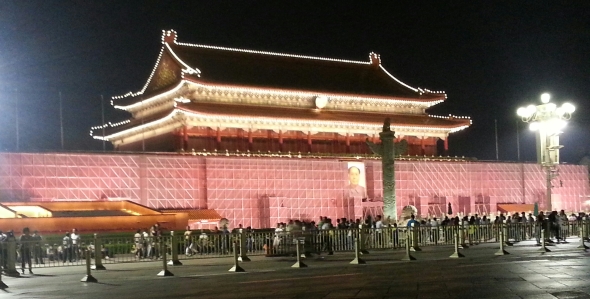
Everything at Tiananmen seems to be undergoing restoration — except for Chairman Mao
I’m not one of those often-wrong, never-in-doubt Americans who visits a city for a week and decides he knows everything about its history, culture and politics.
That having been said, I do have a few first impressions through the eyes of a China newbie. Here are some random observations of life in Beijing by the numbers:
7
Number of Beijingers wearing anti-pollution face masks
5
Number of Beijingers wearing bike helmets
0
Number of Beijingers who have used hand signals while riding bikes
2

Cornering the market on blondes in Beijing: with Caroline Ward (left) and Jane Sasseen (right)
Number of Beijingers holding a cell phone while biking in traffic
8
Number of blonde people sighted in Beijing
5
Number of blonde people sighted in Beijing who are not friends or students of mine
5
Number of European-origin people seen on the subway
0
Number of people speaking English on the subway
9
Number of Kentucky Fried Chicken restaurants seen around town
0
Number of people who have asked me about the Cowboys, Redskins, Eagles, Texans, Ted Cruz, the Tea Party, Mitch McConnell, Nancy Pelosi or Capitol Hill gridlock
1
Number of students who have asked me about the American government’s lies leading up to the invasion of Iraq
8
Number of universities in this section of northwest Beijing
3
Number of Texas on the Potomac alumni now living and working in Beijing
3
Number of people I’ve met who have worked or studied in Pennsylvania
1
Number of Texas Aggies I’ve run across. (Gig ’em, Caroline!)
Posted: September 3, 2013 | Author: Rick Dunham | Filed under: Rick in the news, U.S. politics | Tags: Barack Obama, Joe Biden, John Boehner, John Cornyn, John Kerry, Nancy Pelosi, President Obama |

President Obama meets with a bipartisan delegation of congressional leaders. (White House pool photo by Rick Dunham)
On my final day at the Houston Chronicle, I was fortunate enough to have White House pool duty, where I witnessed up close the debate over possible military action against Syria. Here is the pool report I filed to fellow reporters:
In-town Pool Report #1
Meeting with Congressional Leaders, Pool Spray
With the Obama administration ramping up its efforts to persuade Congress (and the American people) to back a resolution supporting a U.S. military response in Syria, President Obama met with a bipartisan group of 16 lawmakers in the Cabinet Room.
A tight pool got a glimpse inside at the top of the meeting. (Check TV video for more precise quotes and more atmospherics.)
The President was seated between House Minority Leader Nancy Pelosi, on his left, and House Speaker John Boehner, on his right. Flanking Pelosi were Senate Minority Leader Mitch McConnell, House Majority Whip Eric Cantor, Sen. Dianne Feinstein and Rep. Eliot Engel. Flanking Boehner were National Security Adviser Susan Rice, Senate Majority Whip Dick Durbin, House Minority Whip Steny Hoyer and Sen. Bob Menendez.
Vice President Joe Biden sat directly across the table from the President. The VP brushed his fingers across his temples and held his hands clased in front of his mouth as the President spoke.
Secretary of State John Kerry, seated at one end of the table next to Rep. Engel, sat with his hands clasped in front of his chin.
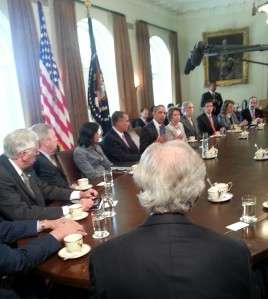
John Boehner and Nancy Pelosi flanked President Obama at the White House this morning, then endorsed action against Syria. (Pool photo by Rick Dunham)
White House press secretary Jay Carney stood behind Kerry.
The congressional leaders sat without expression throughout the President’s six minutes of public remarks.
President Obama began speaking at 9:52 a.m. EDT, summarizing his case that Syria “should be held to account” for what he said was clear evidence of chemical weapons use.
“I made a clear decision that America should take action, ” he said.
He then addressed the congressional leaders, calling for hearings and a “prompt vote” on a Syria resolution.
“The key point that I want to emphasize to the American people,” President Obama said in the take-away quote (check transcript for accuracy): “It is proportional, it is limited, it does not involve boots on the ground. This is not Iraq. Thos is not Afghanistan. This is a clear proportional response…”
The President responded to one question, saying the U.S. “will be more effective” if Congress approves a resolution. President Obama said “I’m confident” Congress will act.
The pool was ushered out at 9:58 as the President twice said, “Thank you, guys.”
He then started the meeting by saying “good to see you, Buck” to Rep. Buck McKeon.
Other lawmakers in attendance were Sens. John Cornyn, Bob Corker and Carl Levin, plus Reps. Kevin McCarthy, Ed Royce, Dutch Ruppersberger.
White House reps also included Defense Secretary Chuck Hagel, James Clapper, General Martin Dempsey, Rob Nabors, Ben Rhodes, Miguel Rodriguez, Tony Blinken and Jake Sullivan, per pool wranglers.
Some of the lawmakers may speak at the stakeout after the meeting. Open press.
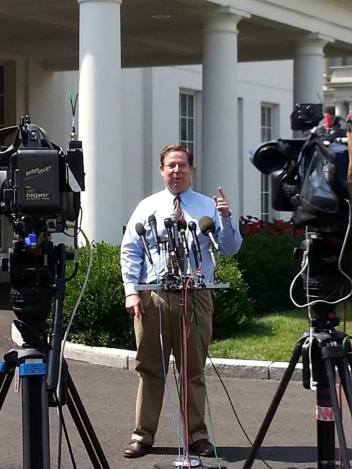
The lawmakers — and the camera people — had left the White House stakeout point when I decided to give farewell remarks. (Photo by Sarah Ferris)
On a personal note, today is my final day with the Houston Chronicle. I am heading to Beijing tomorrow to teach multimedia journalism and run the Global Business Journalism program at Tsinghua University’s graduate school of journalism. It has been an honor and privilege to cover the White House for most of the past 29 years.
I’d like to salute the hard-working White House correspondents who strive for transparency, access and information. And I’d like to wish Godspeed to President Obama, my (very) distant cousin on the Dunham side. My grandfather Barrows Dunham and President Obama were both known as Barry to their schoolmates, but the comparisons end there.
















Recent Comments